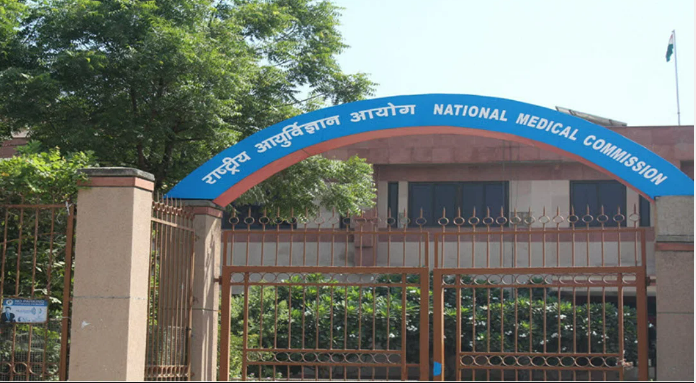NMC’s Guidelines for MBBS Admissions and Curriculum: What You Need to Know
The Graduate Medical Education Regulation 2023 guidelines, which provide crucial instructions for universities and colleges on MBBS admissions and curriculum, were recently announced by the National Medical Commission (NMC). We shall examine the main tenets of these principles in this article, including the admissions procedure, curriculum design, instructional strategies, testing procedures, and the implementation of the National Exit Test (NExT).
The Graduate Medical Education Regulation 2023 rules were created by the NMC in an effort to raise the bar for medical education. These regulations seek to speed up the application procedure for MBBS programmes and guarantee that the medical credentials awarded follow a set schedule. It is essential for universities and colleges to adhere to these recommendations in order to make sure that their programmes satisfy the standards of the NMC.
Rules and Procedures for Admission
The NMC has given institutions the directive to start first-year MBBS programmes on August 1 of every year, with a very rigorous August 30 deadline for admissions. It is emphasised by the commission that any student enrolled after August 30 will not be registered and their medical credentials will not be acknowledged. The academic year 2023–2024 is covered by these rules.
The rules demand that uniform counselling be used for admission to graduate medical programmes at all Indian medical institutions in order to promote fairness and transparency. This counselling process would be based on the National Eligibility Cumulation Entrance Test (NEET-UG) merit list. However, this clause will go into force after NEET UG 2024.
MBBS Curriculum
For the academic year 2023–2024, there will be three phases to the four and a half-year MBBS curriculum. The first and second stages will each last 12 months, while the third phase, which is divided into parts I and II, will last 30 months.
Students will learn preclinical subjects like Anatomy, Physiology, Biochemistry, and Introduction to Community Medicine throughout their first professional year. In addition, professional development modules covering family adoption programmes, pandemic courses, and attitude, ethics, and communication (AETCOM) will be covered.
Pathology, pharmacology, microbiology, general surgery, general medicine, obstetrics and gynaecology, and additional AETCOM development are the main topics of the second professional year. To achieve a well-rounded education, simulated learning and exposure to clinical topics are also introduced.
The Forensic Medicine and Toxicology, Community Medicine, Medicine and Allied Specialties, Surgery and Allied Specialties, Paediatrics, Obstetrics and Gynaecology, and AETCOM modules are all included in the third professional year (part I). The provision of clinical instruction in a variety of fields gives students practical training.
The study of Obstetrics and Gynaecology (including Family Welfare), Paediatrics, AETCOM modules, and Medicine and Allied Specialties is covered in the third professional year (part II).
Approaches to learning and teaching
The recommendations place a strong emphasis on a balanced method of instruction to improve the learning experience. Didactic lectures shouldn’t take up more than one-third of the timetable; the other two-thirds should be devoted to group activities, practicals, clinical discussions, and interactive sessions. Case studies, problem-oriented methodologies, clinical experiences, and community health care initiatives should all be incorporated into the learning process.
Exams for the MBBS and supplemental exams
Students must adhere to attendance rules in order to advance academically. To be eligible for topic examinations, you must attend at least 75% of your theory sessions and 80% of your practical or clinical sessions. Students will not be permitted to sit for the Third Professional Part II test or the National Exit Test (NExT) if they do not meet the attendance requirements for electives.
At the conclusion of each academic year, students who do not pass the university exams will take additional exams. Within three to six weeks of the announcement of the results of the primary examination, these exams and the declaration of results shall be processed. Candidates who succeed in the additional exams may advance by joining the regular batch.
(NExT) National Exit Test
The National Exit Test (NExT), which will be administered at the conclusion of the third professional part II training in either the 17th or 18th month, has been adopted by the NMC. General medicine, general surgery, ophthalmology, otorhinolaryngology, obstetrics and gynaecology, paediatrics, and associated subjects will all be covered in the NExT exam. The NExT test will be taken by MBBS students from the 2023–24 batch in December 2027 or January 2028. The test will then be administered annually in December or January.
The National Medical Commission’s Graduate Medical Education Regulation 2023 policies seek to harmonise the admissions procedure and course content for MBBS programmes in India. These regulations create a clear framework for colleges and universities to adhere to, ensuring that medical education complies with the NMC’s requirements. The NMC wants to raise the overall standard of medical education in the nation by putting these recommendations into practise.




























